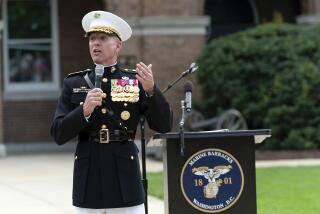Leonard Chapman; Headed Marines, INS
- Share via
Leonard F. Chapman Jr., the former Marine Corps commandant who supervised the corps’ withdrawal from the Vietnam War, has died of cancer. He was 86.
Chapman, who served as head of the U.S. Immigration and Naturalization Service after his retirement from the Marines, died Thursday at a hospital in Fairfax, Va., a suburb of Washington.
Chapman was named to the INS position by President Richard Nixon and served from 1973 to 1977.
An artillery officer by training, Chapman served aboard a Navy cruiser and with Marine landing forces in the Pacific in World War II. He was assistant commandant of the Marine Corps when President Lyndon B. Johnson passed over two better-known officers who had been touted for the job and appointed him commandant. He took over Jan. 1, 1968, and served four years.
Within weeks, communist forces launched the Tet Offensive across South Vietnam. Marines were heavily engaged in the battle for Hue and in the siege of Khe Sanh near the demilitarized zone between North and South Vietnam.
Known for cool efficiency, Chapman also gained a reputation for his sense of humor. When Johnson’s son-in-law, Marine Capt. Charles S. Robb (who later became Virginia’s governor and a U.S. senator) was assigned to Vietnam, newsmen asked Chapman if special guards would be provided, equivalent to Secret Service protection at home. “I think,” Chapman told The Times and other media, with a slowly developing grin, “the Marines are capable of providing the necessary security out there.”
As disenchantment with the war spread, Marine ground forces began to be withdrawn. Under Chapman’s direction, the process was completed in 1971. His slogan was, “Don’t leave anything behind worth more than $5.”
Drug and alcohol abuse and racial unrest also became serious problems within the Marines, and Chapman responded with a combination of discipline and a broad range of programs designed to promote understanding between the races and eliminate discrimination in assignments and promotions.
One of his innovative orders created a human relations school at the San Diego Marine Corps Recruit Depot.
Chapman also began the task of downsizing his branch of the military.
James L. Jones, the current Marine commandant, said Chapman “guided our corps through turbulent times, demobilization and the ultimate recovery from the Vietnam years. His many contributions kept the Marine Corps on the right path and brought us to where we are today.”
A native of Key West, Fla., Chapman graduated from the University of Florida and entered the Marine Corps in 1935 through the Reserve Officers’ Training Corps.
A widower, he is survived by one son, Walton, and a granddaughter.

